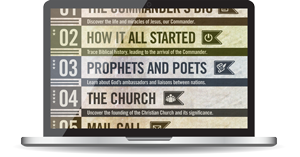The Two Sides of Mission
Week Summary
What opportunities do you see for living ‘on mission’ for God in the military?
This week, Jesus teaches us about the two sides of ‘mission’: love God, love others. How we treat others reveals our true dedication to Christ. If we love God, that love will show up in the way we love and serve others. Explore ways you can love others in your Military community to show them that you love God.
About This Journey
As Christ followers, we are the hands, feet, and voice of Jesus wherever we are. “Dedicated to God’s Mission” explores what it means to be a dedicated Christ-follower on a mission for God everywhere He takes us. Jesus had urgency and purpose in what He did and where He went. Together, we travel with Him and the disciples and learn from His attitude of love and service.
This Week's Readings
Ambushed!
Read
And they came again to Jerusalem. And as he was walking in the temple, the chief priests and the scribes and the elders came to him, and they said to him, “By what authority are you doing these things, or who gave you this authority to do them?” Jesus said to them, “I will ask you one question; answer me, and I will tell you by what authority I do these things. Was the baptism of John from heaven or from man? Answer me.” And they discussed it with one another, saying, “If we say, ‘From heaven,’ he will say, ‘Why then did you not believe him?’ But shall we say, ‘From man’?”— they were afraid of the people, for they all held that John really was a prophet. So they answered Jesus, “We do not know.” And Jesus said to them, “Neither will I tell you by what authority I do these things.”
-Mark 11:27-33Reflect
A popular morning show features a segment they call “Ambush Makeover.” Beauty experts ambush an unsuspecting audience member, whisk her away and return her in an hour with updated hair, makeup, and clothes. The results are astounding. It’s the kind of ambush I would welcome.
There are other times when an ambush is not so welcome. Christ-followers get ambushed all the time, don’t we? For instance, how many times have you been ambushed with questions like, “Why would a loving God allow war? Suffering? Disappointment?” Sometimes people are genuinely looking for an answer, but often the questions are asked in a sarcastic tone.
Jesus was ambushed by the religious leaders of his day with the question, “By what authority are you doing these things?” The question was not asked from any desire to learn the truth, but to catch Jesus off guard in a “wrestle for control.” They confronted Jesus as if they were conducting an interrogation. The setting does not convey an open-minded request for information.
Certainly Jesus could win any argument, but he was not argumentative here. He used the techniques of the rabbis better than they did! He offered to answer their question. But first he asked them to validate their authority to question his authority by answering a question he posed. His response defused the confrontation because the leaders no longer wanted to proceed with the argument. They are left uttering the words, “we don’t know …” Sisters, there is a lesson here for us: There is a time to argue the facts and a time to realize that arguments will not produce anything good.
Respond
How do you respond when you are ambushed with questions about your faith? How can you defuse such confrontations?
Prayer
Lord, help me always be prepared to make a defense with gentleness and respect to anyone who asks me for a reason for the hope that is in me (1 Peter 3:15). Amen.
What’s Your METL?
Read
And one of the scribes came up and heard them disputing with one another, and seeing that he answered them well, asked him, “Which commandment is the most important of all?” Jesus answered, “The most important is, ‘Hear, O Israel: The Lord our God, the Lord is one. And you shall love the Lord your God with all your heart and with all your soul and with all your mind and with all your strength.’ The second is this: ‘You shall love your neighbor as yourself.’ There is no other commandment greater than these.”
-Mark 12:28-31Reflect
Among the plethora of military acronyms is METL: Mission Essential Task List. Simply put, METL is a list of things that are nonnegotiable to accomplish a mission.
If we read Mark 12:28–31 with military mission in mind, we could say it includes the METL for a Christ-follower. First on the list: Love the Lord. Second on the list: Love your neighbor. Sisters, our METL is held in these two sentences.
Put yourself in the place of the scribe questioning Jesus. “Which commandment is the most important of all?” He was not expecting a simple answer. He knew there are 365 prohibitions and 248 positive commands in the Torah or Jewish Law. But the answer Jesus gives was both succinct and compelling.
Jesus’s words emphasize too that following him is not about a list of things we must do for God’s approval. Following Jesus is a call to himself. It is a call to love him supremely and to love others as we love ourselves. Loving others is the visible expression and practical display of my love for God. It is how God’s love spills over in my life.
At first, it would seem that Jesus made serving God easier by narrowing the list of commands from 613 to two. But when followed wholeheartedly, these two commands inspire an unlimited number of actions. The METL of a military unit is usually short and simple to read, but it can can be complex and challenging to accomplish, and must be continuously practiced. The METL Jesus provides for our lives is short and easy to memorize, but we never can check off the list as complete. We make every effort, by faith in Christ, to increase our love for God and others.
Respond
What have you done over the last week to support these two primary tasks in life?
Prayer
Lord, show me the things that keep me from loving you with my whole heart. Increase my love for you, and show me ways to demonstrate that love in my love of others. Amen.
Two Coins
Read
And he sat down opposite the treasury and watched the people putting money into the offering box. Many rich people put in large sums. And a poor widow came and put in two small copper coins, which make a penny. And he called his disciples to him and said to them, “Truly, I say to you, this poor widow has put in more than all those who are contributing to the offering box. For they all contributed out of their abundance, but she out of her poverty has put in everything she had, all she had to live on.”
-Mark 12:41-44Reflect
Small. Minimal. Insignificant. Trivial. Unimportant. Irrelevant. Inconsequential.
These words may have been in her mind as the poor widow dropped the coins into the offering box. What the woman contributed was the smallest denomination of currency in use at the time. Each coin was less than a penny. The gift quite possibly left her without the means for her next meal. Her generosity is an example for us to follow. She could have given just one of the coins, but she was down to her last penny and she gave it all.
Huge. Maximum. Significant. Monumental. Important. Relevant. Useful.
These words point to the way Jesus viewed the widow’s action. Notice that Jesus sat down opposite the offering box. He stopped. He rested. He observed what people were doing and he noticed this poor widow.
Let the beauty of this scene wash over you. Maybe words like small, minimal, insignificant, trivial, unimportant, irrelevant, and inconsequential describe how you feel about what you have to offer God. But God does not judge you by your own standards, nor the standards of the world. He is observing what you are able to give, and his system of evaluation is different than our system. The giver matters more to him than the gift.
He noticed the poor widow’s heart, not what the gift could buy. He notices you, my sister, and he values whatever you give to him and to others in his name.
Respond
Does anything make you feel like what you have to offer God is not enough? Grab your journal and jot down God’s truth about you and your offering from these Scriptures:
- Galatians 2:20
- Isaiah 43:1
- 1 Peter 2:9
Prayer
Lord, remind me that your eye watches over those who fear you and rely on your unfailing love (Psalm 33:18). Amen.
A Bystander
Read
And they compelled a passerby, Simon of Cyrene, who was coming in from the country, the father of Alexander and Rufus, to carry his cross.
-Mark 15:21Reflect
The last journey of Jesus before his death was to walk a road we now call his Via Dolorosa—the Way of Sorrows. It was the final segment of the most important journey ever taken.
If you go to Jerusalem today you can walk the Via Dolorosa. The route passes through congested streets replete with snack stands and souvenir shops. Historians differ on the exact route Jesus took on his way to the cross, but pilgrims still find great significance in being in close proximity to his path. Each Friday afternoon a Catholic priest leads a procession that repeats the final journey of Jesus from the Praetorium of Pilate to the hill of Golgotha, site of the crucifixion.
The final road Jesus walked was one no human could survive. He knew it meant death. His body became weak as he struggled to carry the weight of his cross. The custom of the day allowed Roman soldiers to commandeer local citizens to carry excess baggage for them. On this day the soldiers interrupted the life of a bystander, Simon of Cyrene, to carry the cross for the condemned Jesus.
There is no question that Simon was forced to bear the cross for Christ, but I also see the situation as him being invited by God to participate in this most important mission. People were called to participate in the mission of Jesus from his birth to his death and resurrection. Such was the case for Simon. He was not a simple bystander. He walked the road. He carried the burden.
Simon could represent each one of us. We are not forced, but we are called to bear the cross of Christ. For a few minutes, the cross of Christ became Simon’s cross to bear.
There is a cost to be identified with Jesus. There is also joy in walking beside him. The joy for Simon most likely included becoming a follower of Christ. Numerous biblical scholars believe Simon became a dedicated believer, and that his sons Alexander and Rufus became leaders in the early Christian church.
The cross represents the mission of Christ. Jesus used the same metaphor to describe his mission for us when he said, “Whoever wants to be my disciple must deny themselves and take up their cross and follow me” (Mark 8:34 NIV). What mission does Christ have for you? What road does he have for you to walk? Just as Simon walked beside Jesus, you can rest assured that Jesus will walk beside you.
Respond
What does it mean to you to “deny yourself and take up your cross?”
Prayer
Lord, thank you for inviting me to be part of your mission in the world. Let your will be my will. Amen.
She Did What She Could
Read
And while he was at Bethany in the house of Simon the leper, as he was reclining at table, a woman came with an alabaster flask of ointment of pure nard, very costly, and she broke the flask and poured it over his head. There were some who said to themselves indignantly, “Why was the ointment wasted like that? For this ointment could have been sold for more than three hundred denarii and given to the poor.” And they scolded her. But Jesus said, “Leave her alone. Why do you trouble her? She has done a beautiful thing to me. For you always have the poor with you, and whenever you want, you can do good for them. But you will not always have me. She has done what she could; she has anointed my body beforehand for burial. And truly, I say to you, wherever the gospel is proclaimed in the whole world, what she has done will be told in memory of her.”
-Mark 14:3-9Reflect
At face value it is hard to grasp the custom, but in Jesus’ day it was common for olive oil to be poured on the heads of guests as a symbol of honor and a rite of refreshment. The oil was soothing to dry, parched skin. In Mark 14:3–9 Jesus was at a dinner party with friends and a woman entered the room carrying a jar filled not even with common oil but with expensive perfume. She broke the jar and drenched Jesus with it. Her action was as extravagant as the contents of the jar.
The onlookers, perhaps concerned to look good before the rabbi were quick to scold the woman. They saw her excessive offering as a waste of valuable resources. Jesus stopped their attack, and then he said these words: “She has done what she could.”
Think about those words. “She did what she could.”
A doctor says “I did what I could” when a patient dies.
A parent says “I did what I could” when a child goes astray.
I say “I did what I could” when I need an excuse for not doing my best.
“I did what I could” is a phrase of resignation when I am not able to do what needs to be done, when I can only do a portion of an assignment. I say those words when I cannot do enough.
When Jesus uttered that phrase it was not to criticize the woman for not doing enough. To the contrary, she did exactly what she needed to do.
The Spirit of God was orchestrating every event of the week that led to the death and resurrection of Jesus. The Spirit motivated this woman to serve Jesus in an extravagant manner. Jesus saw it as anointing him for burial, pointing to his imminent crucifixion. That’s why the memory of her act is associated with the proclamation of the gospel.
When you put all you can do in the hands of the Lord, he can make it more than enough.
Respond
What are some words that come to mind when you think of the woman’s actions toward Jesus? What words describe your actions toward Jesus this week?
Prayer
Lord, give me a sensitive and sacrificial heart toward you in gratitude for all you have done for me. Amen.
Resources & Info
Resources to help you and other military wives in your community.
Are you enjoying these resources?
Sign up now to save your Journey progress and your favorite Segments.
Your download is being prepared.
- Small Group Resource: Dedicated 2 - Leader's Guide
- Small Group Resource: Dedicated 2 - Participant's Guide



